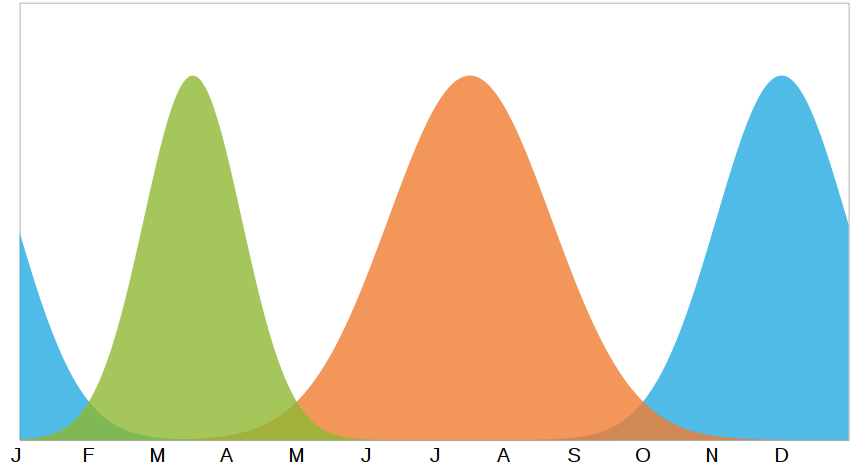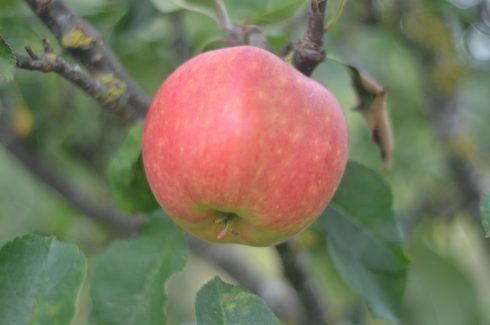The autumn has really started now on the British Isles with windy storms, short but heavy rains, and cold nights. What I immediately noticed in myself (and heard my friends and relations complain) is disturbed sleep, unexplained anxiety, overall dryness, and decreased appetite.
Ayurveda has a clear explanation of why all these symptoms started taking place: it is the beginning of the Vata season in Northwestern Europe which will hit its peak by the beginning of December (Fig. 1). Vata then slowly goes down and is superseded by Kapha in February, which, in turn, peaks in mid-March and then slowly decreases and clears the space for Pitta by the end of May. Then Pitta increases and reaches its peak in mid-July and then slowly goes down until it is completely gone by the end of September, making space for Vata. And the cycle goes on and on.

Fig.1 The seasonal rhythms in Northwestern Europe. Vata is blue, Pitta is orange and Kapha is green.
In the Ayurvedic model, there are three functional forces, or principles, that control physical reality: Vata (movement), Pitta (transformation) and Kapha (stability). Each of these principles has its own qualities that you can learn to recognise in the world around us. Each principle can be in or out of balance, and there will be certain symptoms associated with an imbalance of movement (Vata), transformation (Pitta) or stability (Kapha).
As said above, autumn and early winter are dominated by Vata, which you can recognise by the following qualities: dry, cold, mobile, rough, transparent, subtle, clear. In fact, in windy places like British islands there is another pick of Vata aggravation during the transition from Vata to Kapha in February (think of storms that usually happen around November and February!).
During this season, people who suffer from Vata-related disorders may notice their symptoms flare up. These include different aches and pain, bloating, constipation, indigestion, insomnia, anxiety, panic attacks, fatigue, depression, eczema, skin rashes (especially dry types) and so forth.
What can you do to support yourself during the Vata season?
Vata is mobile, which means that it can easily get out of balance. It is important to provide your body and mind some support during this period in order to minimise deleterious effects of Vata aggravation.
As we know, like increases like and opposite decreases opposite. Therefore, in order to counteract the increase of Vata qualities that inevitably happens at this time of the year, the following steps can be taken:
- Eating warm food, significantly reducing or eliminating raw food. The best foods for Vata season are thick nourishing soups and stews.
- Consuming local-seasonal-organic products, whenever possible. Usually what nature provides at a certain time in a certain place is best for people living in that place.
- Using small amounts of warming spices like cinnamon, ginger (fresh), cloves, turmeric, pepper, asafoetida, rosemary, thyme etc.
- Avoiding cold drinks, taking warm or hot water during and between meals.
- Minimising stimulants like coffee and strong tea, they do increase Vata significantly.
- Working towards establishing a daily routine: going to bed, waking up and having meals at more or less the same times. Regularity decreases Vata.
- Oil treatments efficiently counteract dry, light and cold qualities of Vata. Performing regular abhyanga (application of oil all over the body followed by a hot shower or bath) help a lot during the Vata-season. You can also use our professional Ayurvedic massage services if you are in the area.
- Keeping your extremities warm (feet, hands, ears, etc). Protecting yourself from cold winds and draughts.
- Going for walks, even if the weather is not pleasant. This allows the body to more quickly adjust to the new season.
* * *

On a side note, a few words about apples as autumn is also the season of his wonderful fruit. There is one annoying thing about apples: when eaten raw, they can seriously aggravate Vata and cause bloating, abdominal pain, or indigestion, especially if eaten in the evening. Or, sometimes, they can be irritating to the gums because they are too sour. Some people can also be allergic to raw apples. Yes, raw apples are cold and light (just like most raw fruit and veg!) and they do increase Vata. The good news is that cooked apples pacify Vata very well. They can be used for baking apple pies, crumbles, cooked with sugar, salt, spices and ghee (or butter) and then pureed, or simply baked. One of my favourites is kompot – a very easy to make tasty nutritious drink that is popular in Eastern Europe (it is different from what is known here as compote). Just wash and chop 6-8 apples, place them in 1,5-2.0 l saucepan, add water and 1-2 tb sp of any sugar that you use. Bring to a boil, then simmer for 10 minutes and leave to cool down. If you like you can add spices like cinnamon or cardamom while cooking.

28th September 2018 at 10:31 am
It’d be wonderful to learn a couple of recipes with apples. Thanks for the post!
28th September 2018 at 12:01 pm
Coming soon!
30th September 2018 at 8:54 am
That’s explains some recent changes I have noticed with the cooler nights. I will try the tips about diet and routine
Thanks
11th September 2019 at 1:07 pm
Would be interesting to know what type i am. I know a little, I thought I might be pitta 😊
12th September 2019 at 1:48 pm
You could try this test: https://ayur-vidya.com/quiz/
It gives an idea about both your native (balanced) constitution called Prakruti and your current (imbalanced) constitution called Vikruti. Ignore the message about herbs that they offer, you just need the results of the test.